Russian War Report: Global crackdown on Russian state-affiliated media continues as Russia blocks Facebook
In response to the invasion of Ukraine, governments and corporations have implemented new regulations and policies to mitigate the reach of Russian state-affiliated media within their borders and on their services.
Russian War Report: Global crackdown on Russian state-affiliated media continues as Russia blocks Facebook
Share this story
THE FOCUS
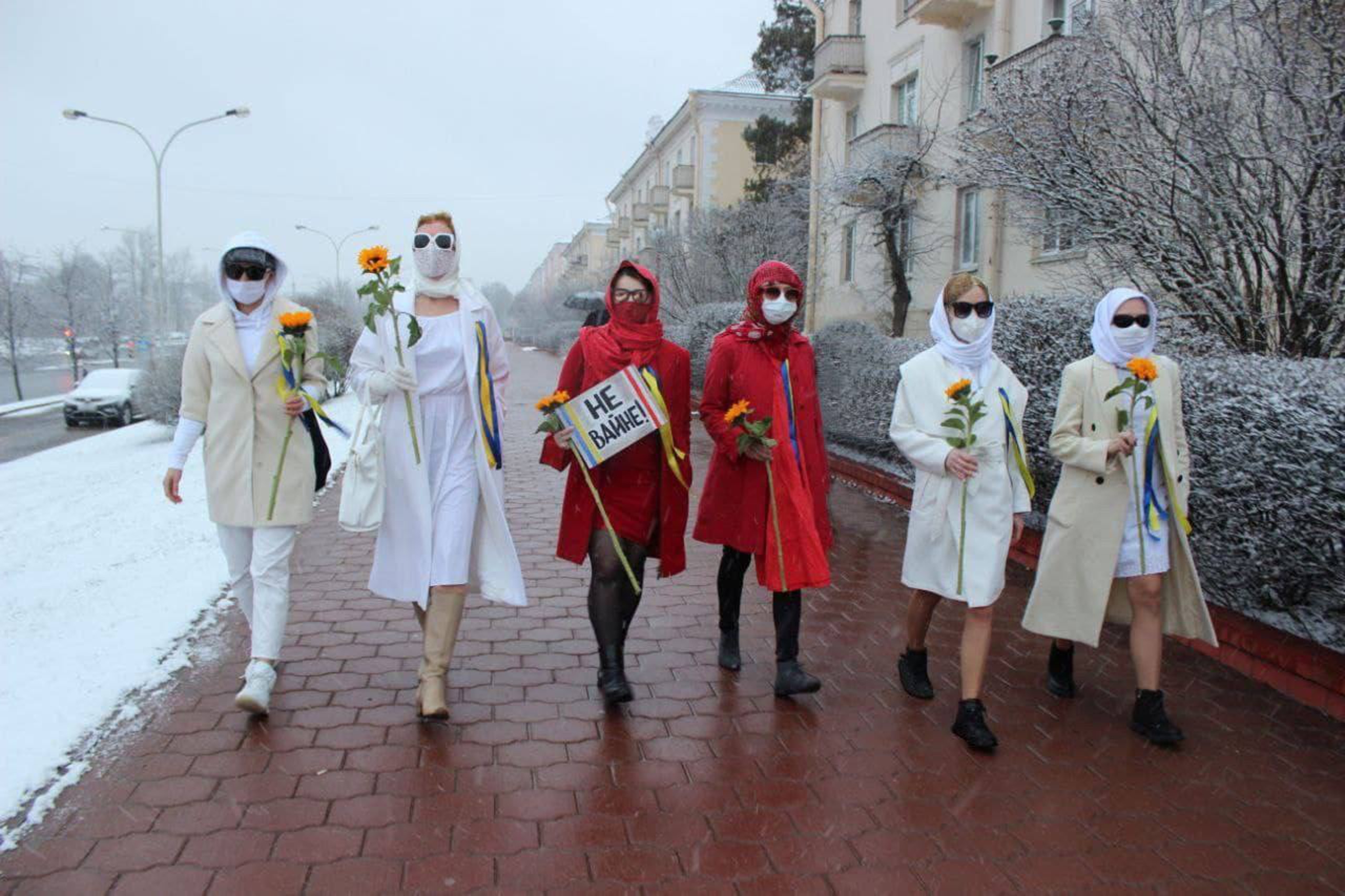
Image: Belarusian protesters from the organization Women of Minsk openly protest the invasion of Ukraine. (Source: @Tsihanouskaya/Twitter)
As Russia expands its assault on Ukraine, the Atlantic Council’s Digital Forensic Research Lab (DFRLab) is keeping a close eye on Russia’s movements across the military, cyber, and information domains. With more than five years of experience monitoring the situation in Ukraine, as well as Russia’s use of propaganda and disinformation to undermine the US, NATO, and the European Union, DFRLab’s global team presents the latest installment of the Russian War Report.
Media policy
Documenting dissent
Security
Tracking narratives
Refugees and migration
Global response
Global crackdown on Russian state-affiliated media continues as Russia blocks Facebook
In response to the invasion of Ukraine, governments and corporations have implemented new regulations and policies to mitigate the reach of Russian state-affiliated media within their borders and on their services.
Notably, the Council of Europe filed a regulatory amendment that effectively bans two Russian state media outlets, RT and Sputnik. In response, Meta, TikTok, and Twitter announced that they would comply, restricting the outlets across their platforms in the European Union. At the same time, YouTube took similar measures, with company officials noting that it will take time to ramp up its efforts. RT and Sputnik content remains accessible on these services outside the European Union, although multiple platforms are taking steps to demonetize, de-rank, or add labels to limit their spread.
In China, popular social media platforms Douyin, Weibo, WeChat, and Bilibili announced they had begun to delete content, accounts, and comments spreading alleged misinformation, calling for war, or making vulgar remarks.
Globally, Apple and Microsoft announced that they would remove RT and Sputnik apps from their app stores outside of Russia, with Microsoft announcing limited distribution through its search and news services, as well as a ban from their advertising services. Spotify also removed these outlets from its platform and closed its Moscow office. Reddit, meanwhile, banned Russian state-media links and ads originating in and targeting Russia, as well as quarantined the subreddits r/Russia and r/Russianpolitics from the platform’s search results.
Online streaming and television providers have also begun to drop RT, with both DirectTV and Roku banning the content on their services, and Skynews halting distribution of programming. Meanwhile, Netflix refused to comply with a Russian government mandate to carry 20 state media channels.
According to a memo obtained by CNN, RT is closing its North American production studios and laying off most of its employees “as a result of unforeseen business interruption events.” In an email, RT editor-in-chief Margarita Simonyan insisted on the trustworthiness of the outlet’s reporting and told readers that they are “strong and brave.”
The response from Roskomnadzor, Russia’s media regulator, has been swift. It demanded that Google cease the distribution of allegedly false information about the ongoing invasion, faulted YouTube for sparking protests in the country, and requested that restrictions on the Russian football club PFC CSKA’s channel be removed. Roskomnadzor also called on Telegram to remove content regarding the Russian Armed Forces, and warned citizens against providing or distributing personal data online regarding relatives or friends in the military.
By March 4, Russia officially announced it had blocked Facebook. Roskomnadzor justified its decision by noting, “Since October 2020, 26 cases of discrimination against Russian media and information resources by Facebook have been recorded. In recent days, the social network has restricted access to accounts: the Zvezda TV channel, the RIA Novosti news agency, Sputnik, Russia Today, the Lenta.ru and Gazeta.ru information resources.”
In a statement on Twitter, Nick Clegg, Meta’s president for global affairs, said, “Soon millions of ordinary Russians will find themselves cut off from reliable information, deprived of their everyday ways of connecting with family and friends and silenced from speaking out.”
—Jacqueline Malaret, Assistant Director, Washington, DC
—Danielle Dougall, Young Global Professional, Washington, DC
Additional reading: Social media companies crack down on Kremlin media outlets amidst government demands for compliance
BBC attempts to circumvent blocking by Russia
Following Russia’s blocking of the BBC’s online Russian service, the broadcaster re-upped its 2019 article on Twitter explaining how to access BBC reporting on the dark web in Ukrainian and Russian via the Tor browser, which helps internet users avoid government censorship and surveillance.
Reports of Russia cutting Web access to the BBC, Voice of America, Radio Free Europe/Radio Liberty, and Deutsche Welle, were confirmed on March 4. According to the Guardian, the BBC website is “available at only 17% of normal levels in Russia.” Two days before its blocking, the BBC reported that the audience of its Russian language news website “more than tripled its year-to-date weekly average, with a record reach of 10.7m people.” The report added, “People in Russia are turning to BBC News in their millions for factual independent information about the war in Ukraine.”
—Eto Buziashvili, Research Associate, Tbilisi, Georgia
RT en Español attempts to circumvent restrictions in Latin America
The Spanish version of Russian state broadcaster RT is trying to circumvent restrictions in Latin America after it was banned in Europe and ceased activities in the United States. On March 2, announced a change in its satellites, saying, “In many [Latin American] countries, TV shows were not available due to the massive restriction of RT’s signal.” Its website published information about the satellite changes for cable operators.
The broadcaster is also trying to teach its audience how to evade possible future restrictions by boosting its social media accounts. Inna Afinogenova, presenter of the YouTube Channel “Ahí Les Va” ( 1.1 million subscribers), suggested audiences should follow RT on traditional social media platforms such as YouTube and Facebook, as well as on Telegram, VK, and Odysee. Alternatively, she added, viewers could use VPNs to access RT content. Notably, Afinogenova used the word guerra (“war”) in the video, despite reports of the word being banned by Russian state media.
RT en Español is one of RT’s most popular language services on social media, with more than twice the number of Facebook followers than RT in English – 18 million followers versus 7.4 million followers, respectively. The invasion interrupted a downward trend in the number of RT Facebook followers, which previously peaked in December 2021. RT en Español’s Telegram channel has also experienced an increase in subscribers and views since Russia invaded Ukraine, with more than 160,000 subscribers at the time of publishing.
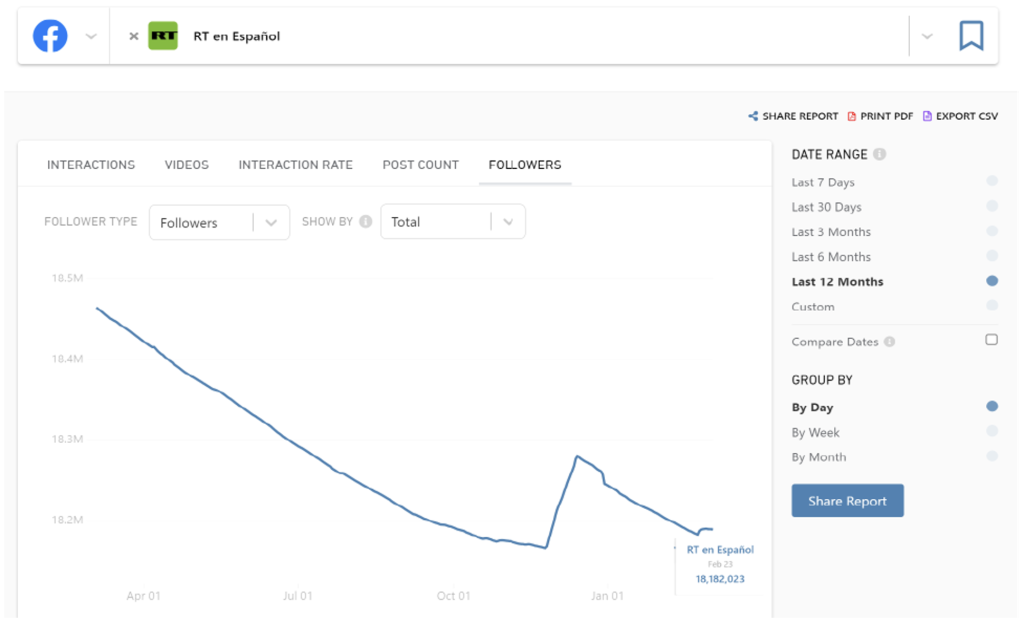

—Luiza Bandeira, DFRLab Associate Editor, Santiago, Chile
Belarusian resistance ramps up to oppose war in Ukraine
On March 3, a group of Belarusian protesters from the organization Women of Minsk were photographed openly protesting the invasion of Ukraine. The photo, shared by Belarusian opposition leader Sviatlana Tsikhanouskaya, shows six women with their faces covered, walking in Minsk. It is unclear if they were arrested. On the same day, the independent Belarusian media outlet NEXTA announced that Oleg Gruzdilovich, a Belarusian journalist with Radio Free Europe/Radio Liberty, had been sentenced to one-and-a-half years in a penal colony.
On March 1, photos surfaced of an anti-war protester and a child in Minsk. Footage showed the protester being detained; the status of the child is unknown. The same day, news emerged of Belarusian protesters working to disrupt Russia’s movements in the country. These protesters, who refer to themselves as partisans, are reportedly former Belarusian policemen. The partisans reportedly burned control stations at Baranavichy and Gomel train stations, and shortened rail chains at Mahiliou station.
On March 2, a video emerged of a lone anti-war protester marching down a traffic-filled road in central Minsk. According to the report, the man was immediately arrested. Also that day, two partisans were arrested due to “terrorist activities,” and now face up to 20 years in prison. Meanwhile, videos of Belarusian volunteers forming military groups and joining the fight in support of Ukraine continue to emerge. The groups are fighting under the country’s former white-and-red flag.
—Lukas Andriukaitis, Associate Director, Brussels, Belgium
Russian momentum continues in Ukraine’s south while stalling in the north
Russia’s momentum continues in the south while stalling in the north, as Ukrainian forces lose territory in the east. In each region, the impact of the war on civilians continues to worsen. With Russia increasingly reaching the new conclusion that Ukrainian cities will not be taken unopposed, instances of rocket, missile, and artillery attacks against civilian population centers have increased in multiple cities. The DFRLab previously reported on Russia’s use of cluster munitions against Kharkiv, Ukraine’s second-largest city. Other major cities like Chernihiv, Izyum, and Severodonetsk remain under consistent shelling, with graphic social media footage documenting the deaths of dozens of Ukrainian civilians. Russia is also tightening its siege of Mariupol, which will likely lead to a surge in civilian casualties.
—Michael Sheldon, Research Associate, Brussels, Belgium
Dead and wounded Russian fighters brought to Minsk
On March 2, reports and videos emerged of Russian ambulance convoys bringing wounded soldiers to hospitals in southern Belarus. The Wall Street Journal reported a “constant flow” of wounded Russian soldiers being brought to Belarusian hospitals.
This comes amidst reports that the morgues in Gomel and Mozyr are filled to capacity. Belarusian opposition representative Anna Krasulina alleged that most of the dead are Chechens whose remains are being “stored” to prevent Chechnya from calculating an accurate death toll.
—Lukas Andriukaitis, Associate Director, Brussels, Belgium
Russian foreign minister and Kremlin media threaten nuclear war
Russian Foreign Minister Sergey Lavrov warned that if WWIII were to occur, it would be nuclear and destructive, according to Kremlin-owned outlet RIA. This follows an announcement last week from Russia that its strategic nuclear forces are on alert amid the war in Ukraine. At the same time, Kremlin media has justified the invasion into Ukraine with claims that Ukraine is creating a dirty bomb, intentionally misleading audiences that such a bomb would be the destructive equivalent of a nuclear weapon. Meanwhile, a pro-Kremlin outlet published a map identifying potential US targets for a Russian nuclear strike, as other fringe outlets and forums have discussed ways to survive a nuclear explosion.
—Eto Buziashvili, Research Associate, Tbilisi, Georgia
Russia broadcasts nationwide ‘lesson’ on ‘liberation mission’ in Ukraine
Russia’s Education Ministry broadcast a nationwide lesson titled “Defenders of Peace” on Thursday evening. The goal was to reach young Russians and inform them “in detail about the background of the events unfolding around Ukraine, explain the danger NATO poses to Russia, and help [people] learn to distinguish lies from the truth.”
According to Lenta.ru, more than five million schoolchildren watched the lesson dedicated to the “liberation mission in Ukraine.” The lesson highlighted the “common history, traditions, cultural heritages” between Ukrainians and Russians. In addition, the lesson stated that “residents of Donetsk, Luhansk, and Crimea chose the side of Russia.”
Lenta.ru also reported a distributed denial-of-service (DDoS) attack occurred during the broadcast, but did not result in any technical issues.
Meanwhile, Meduza reported that prior to announcing the nationwide lesson, the Russian government disseminated teaching guidelines to schools explaining why Russia’s “operation” in Ukraine “is not a war.”
—Eto Buziashvili, Research Associate, Tbilisi, Georgia
Russian pro-war social media campaign fails to gain traction on Twitter and Facebook
Kremlin–controlled media reported on the emergence of an alleged grassroots campaign in support of Russia’s so-called “military operation” in Ukraine. Campaigners used the hashtag #МнеНеСтыдно (#IAmNotAshamed) to show their support for Russia. This comes after many Russian celebrities and citizens publicly stated that they were ashamed of their country’s invasion of Ukraine. As part of the campaign, people in Russia placed a zig-zag pattern resembling the letter “Z” on their vehicles, sheds, and windows to show support for Russian forces who have used this marking on their military equipment, likely used to avoid so-called friendly fire incidents.
Engagement with the campaign on Twitter was relatively minor, and the hashtag did not trend in Russia. In contrast, the hashtag #НетВойне (#NoToWar) previously trended on the platform, but has steadily dropped in mentions since February 24.
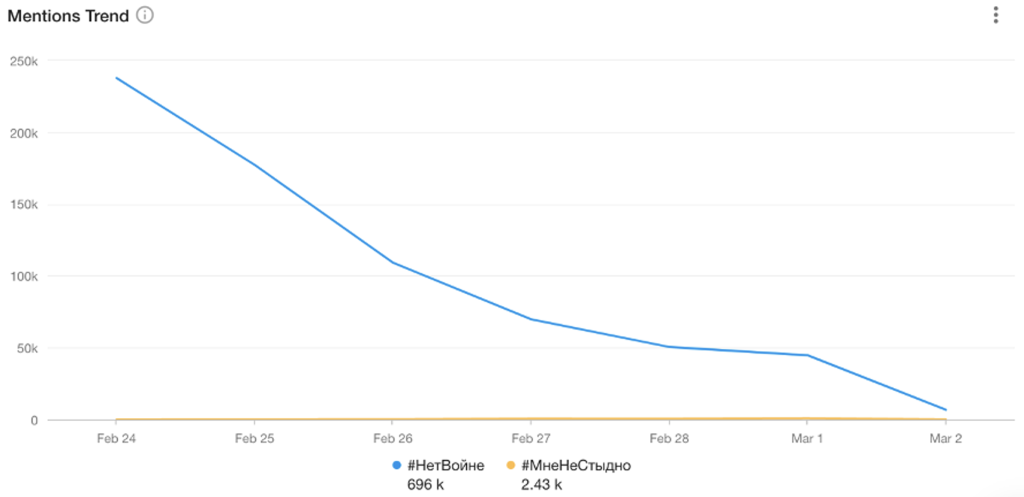
Activity around the pro-Kremlin hashtag on Facebook and Instagram was also modest, in terms of the number of posts published, when compared to anti-war hashtags. At the time of writing, there were only sixteen posts on Facebook and seventy-two posts on Instagram using the #МнеНеСтыдно hashtag. In contrast, there were thousands of posts using the anti-war hashtag #НетВойне, according to a query conducted using the monitoring tool CrowdTangle. On Instagram, however, the pro-Kremlin hashtag had on average more than twice as many interactions as the anti-war hashtag.
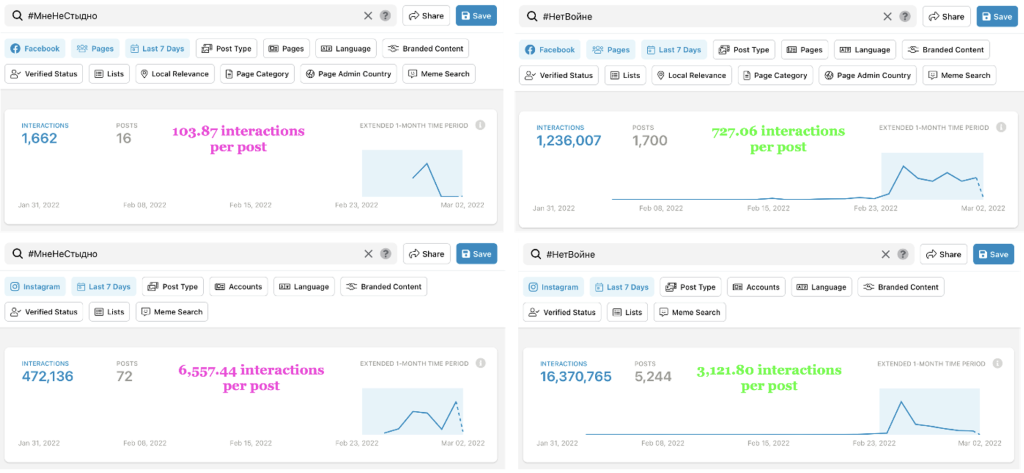
—Nika Aleksejeva, Lead Researcher, Riga, Latvia
Polish extremists attack non-white refugees escaping Ukraine
As thousands of refugees from Ukraine cross the Polish border daily, Polish media reported that Polish far-right activists physically attacked non-Ukrainian refugees on March 1 in the border city of Przemyśl. Right-wing Twitter account @PrawaStronaa posted a video showing how Polish football fans chasing “black immigrants” in Przemyśl.
In parallel with these attacks, various actors on Facebook pushed false claims that non-Ukrainian refugees were committing crimes in eastern Poland. On March 2, the Facebook page Przemyśl Zawsze Polski (“Przemyśl Always Polish”) posted that economic migrants who came from Ukraine to Poland stabbed a young Polish woman and looted several shops. The post claimed that several local groups of football fans joined forces to “clean up the city” of undocumented migrants, supposedly receiving approval from the residents of Przemyśl. On March 4, the Facebook page removed this post. Grzegorz Braun, leader of the far-right party, Confederation in the Polish Parliament, openly supported the creation of such “Citizens Patrols” in Poland.
In response to rumors about crimes committed by non-Ukrainian refugees, Polish police tweeted they had not recorded an increased number of crimes after the refugee influx, and stated that such claims are not true. The DFRLab has previously reported that amid Russia’s aggression against Ukraine, social media accounts in Poland tried to revive anti-Ukrainian sentiments.
—Givi Gigitashvili, Research Associate, Warsaw, Poland
Russians fearing sanctions and prosecution seek to leave the country
Independent Russian media outlets Meduza, The Village, and Media Zona reported on the personal stories of Russians seeking to leave the country amid the war in Ukraine. Media Zona wrote about people’s experiences with Russian border control. Four out of six stories on Media Zona reported on involuntary mobile phone searches seeking out pro-Ukrainian Telegram channels, and questions testing travelers’ loyalty to the Kremlin. Meduza discussed the varying reasons for emigrating from Russia, including economic sanctions and fear of being prosecuted for dissent. The Village reported on the limited travel destinations and flights available for Russians due to the stiff sanctions imposed on the Russian aviation industry after Putin invaded Ukraine.
Some Russians have turned to online forums to discuss plans to emigrate. An unofficial poll conducted by the Russian portal TJournal revealed that 68 percent of respondents planned to leave Russia.
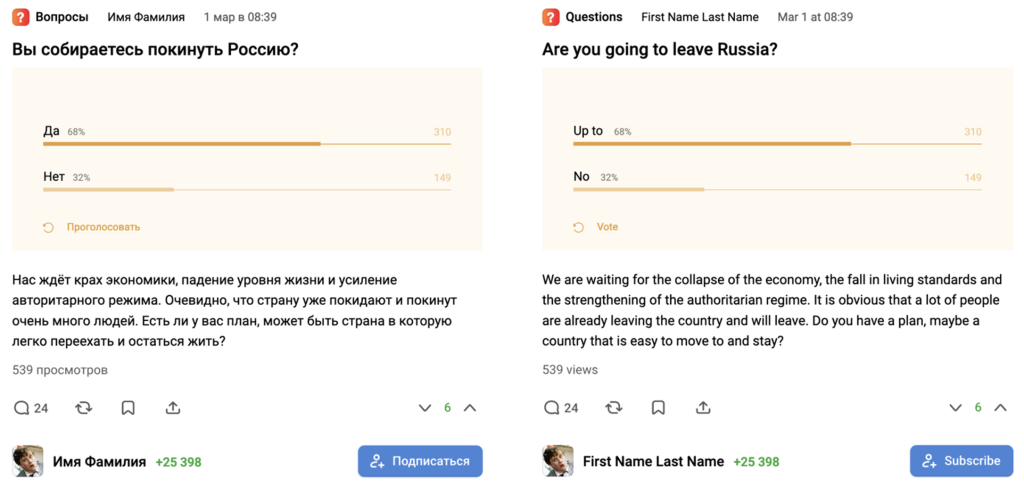
Some of the Russians who shared their stories with Meduza and Media Zona had departed for Georgia, Turkey, or Armenia, as these are easily accessible destinations. An increasing number of Russians are seemingly seeking refuge in Armenia and Turkey to escape prosecution, economic hardship, or European restrictions imposed after Russia invaded Ukraine.
Additionally, the DFRLab identified many posts on Facebook discussing opportunities to leave Russia. Similar posts were identified on Twitter.
—Nika Aleksejeva, Lead Researcher, Riga, Latvia
New sanctions tighten grip on Belarus
On March 2, EU diplomats approved new sanctions against Belarus, including its timber, steel and potash industries. The sanctions reportedly will ban around 70 percent of all imports from Belarus to the EU. That same day, the US hit the Belarusian economy with sanctions restricting exports.
On March 3, International Paralympic Committee banned Russian and Belarusian athletes from the Beijing Winter Paralympics. Initially the committee had planned to allow the athletes to compete under no flags, but changed its stance due to public pressure. On the same day, the World Bank announced that it will stop all its programs in Russia and Belarus effective immediately.
—Lukas Andriukaitis, Associate Director, Brussels, Belgium

